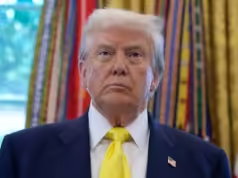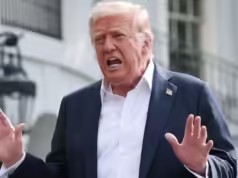On Thursday, US President Donald Trump declared that, as of October 1, 2025, imports of branded and patented prescription medications would be subject to tariffs of up to 100%. The decision may have a big effect on India’s pharmaceutical industry, which is one of the sectors most reliant on trade with the United States.
“Starting October 1st, 2025, we will be imposing a 100 per cent Tariff on any branded or patented Pharmaceutical Product, unless a Company IS BUILDING their Pharmaceutical Manufacturing Plant in America,” the president stated on Truth Social.
The president’s belief that taxes will assist lower the government’s budget deficit while boosting home manufacturing is reflected in Trump’s posts, which demonstrated that his support for tariffs extended beyond the trade frameworks and import levies introduced in August.
“IS BUILDING” will be interpreted as either “under construction” or “breaking ground.” Therefore, if building has begun, there won’t be any tariff on these pharmaceutical products. I appreciate you taking the time to consider this,” he continued.
Trump also imposed a 50% duty on imported kitchen cabinets and bathroom vanities, a 30% duty on upholstered furniture, and a 25% levy on heavy vehicles as part of his most recent tariff blitz.
Trump claimed that the taxes were required “for National Security and other reasons,” which seemed to go beyond the scope of his authority as commander-in-chief, even though he offered no legal explanation for the tariffs.
What Effect Might This Have on India?
India’s biggest export destination for pharmaceutical products is America. According to the Pharmaceuticals Export Promotion Council of India, an industry association, 31% of India’s $27.9 billion in pharmaceutical exports in FY 24—or $8.7 billion, or Rs 77,138 crore—went to the United States. In the first half of 2025 alone, pharmaceutical products worth an additional $3.7 billion (Rs 32,505 crore) were shipped.
More than 45% of generic medications and 15% of biosimilar medications used in the US are reportedly sourced from India. According to reports, companies such as Dr. Reddy’s, Aurobindo Pharma, Zydus Lifesciences, Sun Pharma, and Gland Pharma derive between 30 and 50 percent of their overall revenue from the US market.
Uncertainty surrounds whether sophisticated generics and specialty medications from India would also be subject to the recent American tariffs, even though they seem to primarily target branded and patented medications, a market that is controlled by multinational behemoths. Furthermore, many corporations already have production plants in the United States.
American customers rely on inexpensive generics produced in India. Price increases, inflation, and medicine shortages would result from higher tariffs. If tariffs are placed on them, Indian companies that operate on tight margins in the US generics market would find it difficult to absorb the charges and wind up passing them on to US insurers or consumers.
Trump has already imposed 50% tariffs on imports from India, along with a 25% “penalty” for continuing to buy Russian oil.







